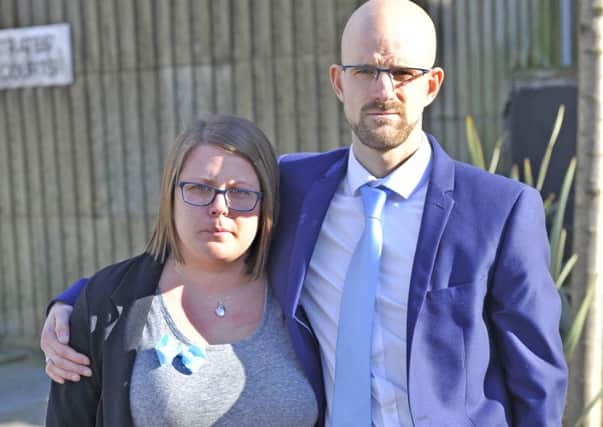Newborn baby died after mother waited six hours to see consultant at maternity ward


Gino Asquith was born at Calderdale Royal Hospital in Halifax without “showing signs of life” after several warnings were detected, including an unusually high heart rate, lack of movement and discoloured discharge.
Bradford Coroner’s Court heard yesterday that the hospital initially told mother Sarah Ellis, 28, there were no beds available and she would have to go to Huddersfield Birthing Centre.
Advertisement
Hide AdAdvertisement
Hide AdShe was sent home after being told her labour was not at an advanced stage. Later that day, November 7, 2014, she could no longer feel her baby move and returned to Calderdale.
Midwives on the ward identified symptoms suggesting the baby might have an infection but it was hours later when Miss Ellis, from Batley, was examined by a consultant.
She was given a button to press while waiting on the ward if she felt the baby move.
But six hours later the button had not been pressed and Gino was delivered through an emergency Caesarean section at 2.34am, November 9.
Advertisement
Hide AdAdvertisement
Hide AdHe was described at hearing as “floppy” and had to be resuscitated twice while being placed on a life support machine.
Three days later Sarah and her partner Adam Asquith were advised to withdraw treatment after Gino had suffered hypoxic ischemic encephalopathy – brain damage caused by lack of oxygen.
Ward co-ordinator, Sarah Balmforth, said there was shortfall of staff – at 4.5 – in the unit compared with the number of patients present at 8pm.
A computer system is used to take stock of staff and patient numbers at various points during evening shifts to ensure midwifes are working where they are required the most. She added that this figure only took fully qualified midwifes into account, not students or those in training.
Advertisement
Hide AdAdvertisement
Hide AdReferring to Miss Ellis’s delayed medical review, which eventually revealed Gino’s serious condition, Ms Balmforth said: “I don’t believe her review could have taken place much earlier than it did because the doctors were busy.”
Midwife Briony Khalifa said the ward was “extremely busy” that evening, with around 18 women at the Calderdale Maternity Assessment Centre. The inquest also heard 18 more women were present in the labour unit, which was considered to be a greater number than usual.
During questioning by deputy coroner Oliver Longstaff, Ms Khalifa accepted there were numerous high-risk factors in Miss Ellis’s pregnancy. It was revealed that the first signs of infection were detected at 9.20pm but Miss Ellis’s condition was not elevated to high risk at that point.
Mr Longstaff said: “A lack of movement is a risk factor for infection. The elevated foetal heart rate can be a sign of infection. A green discharge that she was showing might have been an indication of infection.
Advertisement
Hide AdAdvertisement
Hide Ad“Would you accept that looking at the situation before Miss Ellis was taken to the labour ward there should have been an early medical review?”
Ms Khalifa indicated that she accepted the statements.
Emily Whisker, a medical negligence lawyer at Irwin Mitchell representing the family, said: “They have a number of concerns about the care provided at Calderdale & Huddersfield NHS Foundation Trust and they hope that the inquest will provide them with an opportunity to learn more about the events leading up to Gino’s death and whether any lessons can be learned from the tragedy.”
The inquest is due to conclude today.